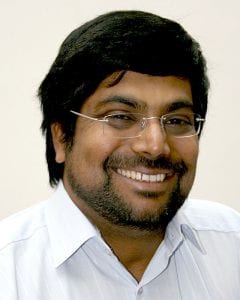A few months into his role as Pro Vice-Chancellor for Research and Innovation, Professor Guy Poppy reports on his impressions so far and his priorities for the immediate future.

Since my arrival here, I’ve been very pleased to find that the positive aspects which drew me to Bristol are playing out. This truly is a comprehensive university, with research strengths from science, engineering and medicine through to theatre, music, economics and beyond.
I’ve been speaking to many people, hearing about the range and brilliance of our researchers and thinking about how we can bring that talent together. We want Bristol to be one of the world’s top 50 universities, and to be known globally as a great place to come and work – and a key route to that objective is joining up our world-class research teams into new combinations that cross disciplines and specialisms, to tackle the big, important societal challenges – climate change, healthy aging, feeding the world sustainably, and so on.
I’ll give just one example among many.
AI + powerful data = healthcare revolution
Our already impressive standing in artificial intelligence has achieved a step-change with Isambard-AI, which will become the UK’s fastest and most powerful supercomputer when it opens this summer (it’s actually been online since last June, facilitating research that includes treatments for diseases such as Parkinson’s and Alzheimer’s). Bristol was named AI University of the Year in 2024 and will play a prominent role in the government’s plan to establish the UK’s sovereign AI capability.
We’re also uniquely placed in the UK through our Department of Population Health, especially since the launch of our Children of the 90s programme three decades ago – one of the most recognised and important epidemiological studies in the world. The Children of the 90s cohorts have helped our teams produce powerful data which is helping to drive research into cancer and a whole range of other illnesses.
Say, then, that you combine these two outstanding examples: Bristol could become known for driving a revolution in which people’s health has been improved through artificial intelligence.
I’ve given a great amount of thought to my priorities as PVC for Research and Innovation. I’m going to concentrate on four here.
1. Concentrating the message
Bristol is excellent at many, many things, but to sharpen your profile effectively, it can be better to push a few things very hard rather than diluting the message across 20 or 30 of them – even though there are easily that many at Bristol. That goes back to uniqueness: picking the five things to concentrate on telling people about – our ‘superbrands’, if you like.
Our academic schools and faculties have a clear idea of their strengths; my job is to consider those strengths in the context of the whole institution, so that, for example, if I visit Harvard University and ask what they think Bristol’s known for, they can tell me because we have ensured that the quality and impact of our research has achieved global recognition.
2. Making a bigger splash
At the same time, conveying the impact of all the work we do is important. Universities need to illustrate the important part they play in society, beyond educating theirstudents, and this is no different for Bristol. Innovation – also part of my brief – can have a high impact, for example by finding new and better ways of doing things, changing public behaviour, or driving the launch of new businesses or whole new sectors.
I want to ensure that the incredible work that happens at Bristol gets better reach to people in the city and beyond, by making a positive, palpable impact on their daily lives. Our new Temple Quarter Enterprise Campus, for example, will enable lots of local businesses to work with academics. Many of those academics are now keen to be able to say that their work has changed public policy, led to the launch of a company or made their field more attractive for people to come and study. We do really have the opportunity to shape the future.
3. Building our culture
Every seven to eight years, UK universities undertake a government-mandated exercise called the Research Excellence Framework (REF), which assesses university research. Bristol did exceptionally well last time, coming fifth in the country. The next REF takes place in 2029, and we’re already planning how to ensure that our research excellence continues to be recognised in those results.
One part of the REF that has increased in importance is ‘people, culture and environment’. That’s all about how you attract and retain researchers by investing in buildings, supporting teamwork, and maintaining high standards of integrity. Professor Marcus Munafo, our outgoing Associate Pro Vice-Chancellor for Research Culture, has done a lot of groundwork to bring these areas together at Bristol. The next stage is making sure that all parts of the University benefit from the tools, workshops and resources that Marcus and his colleagues have established. This will also ensure that Bristol becomes known as a great place to conduct research and have a fulfilling and rewarding career. For example, Professor Harry Mellor (associate PVC for postgraduates) is ensuring that we excel in PhD training and that we help develop the next generation of researchers.
These things are already starting to happen, and if we ensure that our culture and environment consistently supports and encourages our researchers, we should score well not just in REF2029, but long afterwards.
4. Supercharging enterprise and innovation
Universities are often good at spinning out small companies and developing patents, but they’re perhaps less successful at scaling up to big enterprises that generate significant numbers of jobs and money. As the need to find income streams from sources other than student fees or the government becomes more pressing, it’s prudent to look at opportunities for enlarging our ambitions in this area.
Take our National Composites Centre: our teams there are great at producing what our industries need. So what other knowledge do we generate that might service those needs? Who we should be working with, and how? Professor Michelle Barbour, our Associate Pro Vice-Chancellor for Enterprise and Innovation, has been leading our efforts in this area, and I’ll be working with her and her team closely to develop these activities further.
We receive a lot of public funds, and we need to demonstrate that they’re well spent, for example by illustrating how investment in a piece of research can ultimately lead to something groundbreaking, such as the smart phones we all now carry around.
Final thoughts
A university needs to balance its books and make sensible decisions. That doesn’t mean that we should only do things that make loads of money and start to shut down things that don’t. But we must prove ourselves accountable for the public monies we spend and demonstrate the value and impact of our many substantial contributions to society, to the economy and to human knowledge. There is an important role for discovery, as my former colleague and now Minister of Science, Lord Vallance, has recognised.
I’m confident that the University of Bristol will achieve this and more, and I’m looking forward to helping our staff, students and partners to realise our ambition of taking our place in the top 50 universities in the world.




